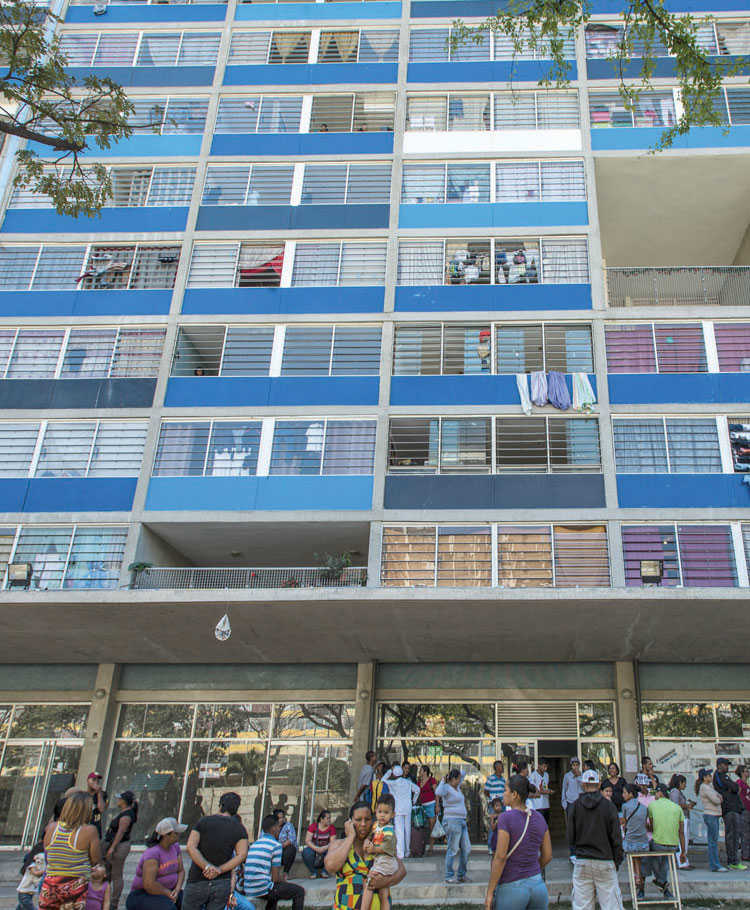A long line for subsidized food at a government housing project in the San Agustin neighborhood of Caracas.
[email protected]
BY NICHOLAS CASEY AND PATRICIA TORRES
The New York Times
Twenty-thousand people live in this concrete bastion built by former President Hugo Chávez. He gave them the keys, and they gave him their votes.
There was one thing Chávez promised but never handed over en masse, though: the property titles that would allow his supporters to sell their homes and cash out.
But now Chávez’s old adversaries want to give away the deeds to hundreds of thousands of homes that Chávez and his movement built.
This handover is as big as just about any of the Socialist-inspired giveaways Chávez ever orchestrated, and it comes with an incongruous twist. For years, the opposition cried foul over Chávez’s tendency to use the spoils of Venezuela’s oil wealth to hand out housing, calling it an obvious ploy to buy votes.
Now the new leaders are drawing from the same populist playbook that they made their name criticizing.
“The opposition is trying to imitate the popular aspects of Chavismo,” said Francisco Rodríguez, an economist at Bank of America Merrill Lynch, referring to Chávez’s political movement.
Having taken power in the National Assembly for the first time in 16 years, Chávez’s opponents quickly carted away the portraits of him from the Capitol. But the country’s disastrous economy is adding to the pressure on the lawmakers to do something popular. The International Monetary Fund is expecting inflation of 720 percent a year in Venezuela, and rampant food shortages create hourslong lines at stores. The price of oil, the country’s lifeblood, has collapsed.
And so the lawmakers have turned to the hundreds of thousands of homes that Chávez and his followers built.
Chávez, who died of cancer in 2013, turned petroleum dollars into concrete, setting off an experiment of moving Venezuela’s poor from slums into high-rises.
Julio Borges, the legislator who is drafting the law, argues that the homes will give capital to the poor for the first time, drive activity to help ease Venezuela’s economic crisis, and let the poor determine their own fates from now on.
President Nicolás Maduro’s supporters see any proposal to transfer the titles as snake oil, a blatant attempt to claim credit for a vast store of homes built as public property.
“We gave people dignified housing,” said Darío Vivas, a legislator in Maduro’s United Socialist Party. “Julio Borges and the opposition haven’t built one home.”
Vivas argued that the government had already delivered on its promise to hand over property titles, a position widely held by leftists. But many experts countered that if the government ever gave deeds to the homes, it was most likely only in a few cases and that most residents do not have titles.
In a fiery State of the Union address before legislators, Maduro vowed to do what he could to block his opponents’ work.
“You will have to topple me first to approve a privatization law,” he said to the applause of leftists.
Here in Ciudad Miranda, about an hour’s drive from Caracas, Coromoto Carmona, 40 and unemployed, looked out a window that was laden with bars. She told the story of how she got her home here and how it has become a place where she feels trapped.
Carmona lost her first home in a deadly mudslide in 1999 and spent five years bouncing between government-run shelters. In 2004, she received a thrilling call from the government: She would attend a meeting at Chávez’s presidential mansion, La Casona, where he would personally award her a new home.
She moved into her two-bedroom home with nine members of her family. But problems soon emerged. Carmona realized there were no places to buy groceries, few schools and no public spaces for residents. These days, there is water for only four hours once a week.
Carmona received only a laminated piece of paper saying she was allowed to live there. If she leaves, it is unclear whether she will be able to find anywhere else to live.
“It’s like jail here,” she said.
Franco Micucci, an architect who worked on Ciudad Miranda, says its social problems are not unique and will be as much a challenge to Venezuela’s new leaders as they were to Chávez’s movement. He says that he and colleagues originally drew up plans for public spaces and services like schools and grocery stores for residents at Ciudad Miranda. But the government built only the homes.
Residents of Ciudad Miranda say the area is now run by armed gangs, known locally as colectivos, that are aligned with Maduro’s party. Despite losing its majority in the legislature, the president’s party won in Ciudad Miranda.
Marquesa Alcendra, 68, wants to sell. After losing her house to a mudslide and bouncing for years between temporary shelters she was given a home in Ciudad Tiuna, a housing project that Chávez erected in a vast Caracas military base.
At first glance, the high-rises look idyllic: new towers with two-bedroom apartments, elevators and common areas.
Yet Alcendra says the only place to buy food is a black market store that sells basic goods for far more than the government-controlled prices. She has boarded up her windows, fearing robbery. And although soldiers from the base guard the entrance to the complex, she says it is her neighbors whom she fears.
“My life was better before,” she said.










